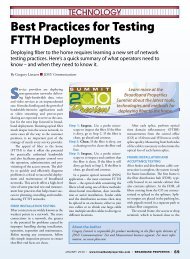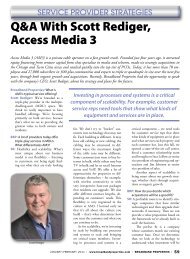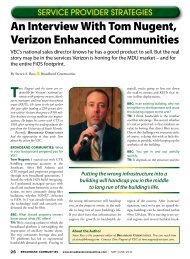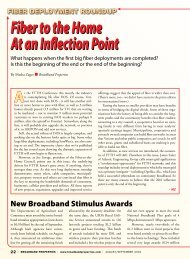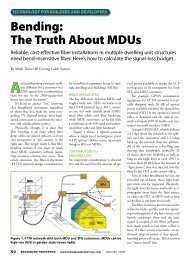2010 Buyers Guide - Broadband Properties
2010 Buyers Guide - Broadband Properties
2010 Buyers Guide - Broadband Properties
Create successful ePaper yourself
Turn your PDF publications into a flip-book with our unique Google optimized e-Paper software.
assigned little of the positive predicted<br />
impact to direct economic growth, however.<br />
It calculated that<br />
• The 1.6 million children in digitally<br />
excluded families could increase<br />
their lifetime earnings by £10.8 billion<br />
(about $20 billion – by far the<br />
largest impact).<br />
• Digitally excluded households are<br />
missing out on average savings of<br />
£560 million (close to $1 billion) per<br />
year from shopping and paying bills<br />
online.<br />
• The most economically disadvantaged<br />
families are missing out on savings of<br />
over £1 billion (roughly $2 billion) in<br />
the prices of items they buy.<br />
• Unemployed adults who get online<br />
for training or job search – or almost<br />
anything else – could increase their<br />
lifetime earnings by over £12,000<br />
each (about $20,000, a surprisingly<br />
small amount).<br />
• If 3.5 percent of the digitally excluded<br />
unemployed could find work by using<br />
employment Web sites, the U.K.<br />
economy would grow by an estimated<br />
£560 million (close to $1 billion).<br />
• Internet-savvy workers can increase<br />
their lifetime earnings by an average<br />
of over £8,000 ($13,500).<br />
• Government could save at least £900<br />
million ($1.5 billion) a year in customer<br />
contact costs if all digitally excluded<br />
adults got online and made just<br />
one electronic contact per month.<br />
Wyatt said, “We don’t have enough<br />
trained volunteers to reach the 4 million<br />
families who are not online. We are<br />
thinking of giving them a netbook and<br />
a free connection [to the Internet] for a<br />
year.” But even that might not work. The<br />
educational outreach centers in the U.K.<br />
are often in pubs and village halls, Wyatt<br />
said, and “many of the 4 million not online<br />
cannot read and write.”<br />
Framework for assessing economic benefits of greater digital inclusion in the U.K.<br />
FRANCE SEES GOVERNMENT<br />
FUNDS NECESSARY<br />
Bernard Benhamou, ministerial delegate<br />
on Internet usage for France’s Ministry<br />
of Higher Education and Research and<br />
the State Secretariat for Digital Economy,<br />
said that inclusion is a European<br />
priority. In France, he said, 96 percent<br />
of connected people use broadband. Although<br />
mobile phones are changing the<br />
way users – especially new users – use<br />
the Internet, the potential for economic<br />
growth justifies government involvement<br />
in FTTH. “Fiber optics in France is supposed<br />
to cost 40 billion euros [about $60<br />
billion, or about $3,000 per household],<br />
so the market cannot do all of this.”<br />
Benhamou said the government is<br />
“working on the next evolution of the<br />
Internet to be used by objects – not<br />
just phones, computers and televisions.”<br />
Little of that effort, if any, is reflected<br />
in estimates of future economic benefits,<br />
he said.<br />
Benhamou also noted that in Europe,<br />
there is “more planning for smart metering,<br />
more work with smaller enterprises<br />
to conserve energy.” That, in turn, leads<br />
to higher calculations of economic benefit<br />
for broadband network connections.<br />
Singapore and Beyond<br />
Andrew J. Haire, deputy director general<br />
(for telecoms and post) for Singapore’s<br />
Infocomm Development Authority, said<br />
that when he arrived in Singapore about<br />
10 years ago, interest in network infrastructure<br />
development was huge. As late<br />
as 2004, however, broadband in Singapore<br />
meant mainly DOCSIS – “and we<br />
knew it would be outstripped,” he said.<br />
“But about five years ago, [interest<br />
shifted] to services … and we are now a<br />
service-oriented market.” Singapore has<br />
November/December 2009 | www.broadbandproperties.com | BROADBAND PROPERTIES | 57





